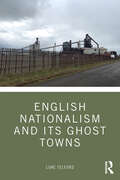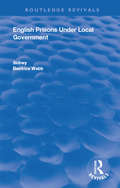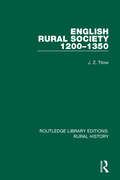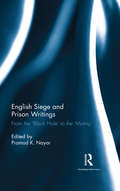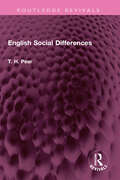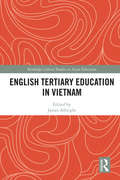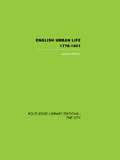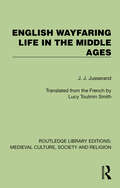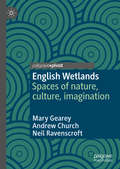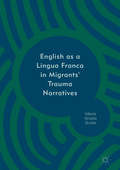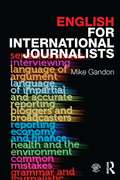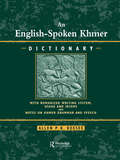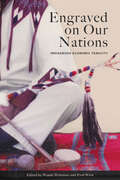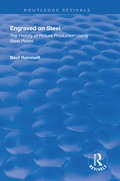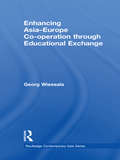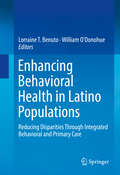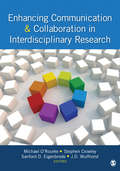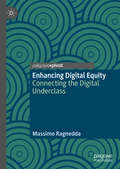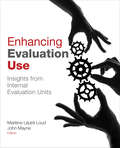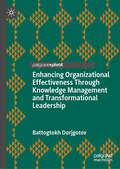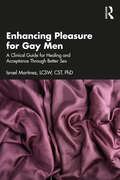- Table View
- List View
English Nationalism and its Ghost Towns
by Luke TelfordIn order to understand today’s nationalism, we need to address the historical decline of working-class communities, the sense of loss brought by deindustrialisation and how working-class people have been denied a voice in society and politics. Discontent has manifested strongly in these deprived post-industrial areas, often branded as communities that have been left behind under neoliberal globalisation. Whilst more and more people are voicing their discontent with a system that fails to provide social security and economic stability, many researchers have branded them merely as racists, xenophobes and ill educated. Although prejudices are likely to play a part in all political outcomes, today’s dissatisfaction across the West cannot be reduced to mere emotion and intolerance. This book therefore utilises on-the-ground research with working-class individuals in a Leave voting locale in Britain, exploring their discontent with politicians, the Labour Party, the European Union, immigration, refugees and the prolonged calls for a second referendum. It situates this sentiment towards society and politics within the decline of capitalism's post-war era and the loss of well-paid industrial jobs, increase in non-unionised service employment and the hollowing out of community spirit.
English Prisons Under Local Government (Routledge Revivals)
by Sidney Webb Beatrice WebbOriginally published in 1968, English Prisons Under Local Government gives a detailed account of the evolution of the English Prison System from the common gaol and the house of correction of the sixteenth century down to the statutory changes of the twentieth century, and survey the successive efforts at reform of John Howard and Elizabeth Fry, Jeremy Bentham and James Neild, Sir T. Fowell Buxton and J. J.Gurney. The origin and development of the cellular system, the treadwheel and the crank, the penal dietary and the 'system of progressive stages' all come under review, together with the administrative changes made by Sir Edmund Du Cane and Sir Evelyn Ruggles, and the reforms during the first part of the 20th century.
English Produced by Japanese L2 Users: A Preliminary Analysis of Grammatical Forms
by Toshiko YamaguchiThis book discusses eight grammatical items, with main focus on prepositions and plural nouns, to illustrate the structure of Japanese English or the English spoken by 32 Japanese nationals who are the L2 users of English. Adopting an inductive, theory-neutral, analysis of empirical data collected from recordings of presentational talks, the author demonstrates how standard and nonstandard grammatical forms are distributed, and categorizes these based largely on functional factors. The book describes grammatical forms as a fundamental aspect of linguistic study and adopts a corpus-driven approach to qualify structural features characterizing usage data. This formalization of language usage patterns also facilitates the development of ‘locally’ relevant norms and thus presents alternatives to the normative varieties traditionally adopted. It examines the effects of multicompetence and unpacks the grammar of Japanese English. The book is of interest to researchers, educators, and students concerned with issues related to World Englishes, English as a lingua franca, English language teaching, and multilingualism, this text is vital to studies in global English language use.
English Rural Society, 1200-1350 (Routledge Library Editions: Rural History #14)
by J. Z. TitowThis title, first published in 1969, is concerned with historic documents and their uses, and with a discussion of living standards among the peasants, as it is the author’s belief that any worthwhile discussion is impossible without an understanding of the sources and their limitations. With its emphasis on the controversial and debateable, this book is admirable proof that a study of medieval history is not merely a matter of memorising facts.
English Siege and Prison Writings: From the ‘Black Hole’ to the ‘Mutiny’
by Pramod K. NayarThis volume brings together an unusual collection of British captivity writings – composed during and after imprisonment and in conditions of siege. Writings from the ‘Mutiny’ of 1857 are well known, but there exists a vast body of texts, from Afghanistan, Sri Lanka and Burma, and the Indian subcontinent, that have rarely been compiled or examined. <P><P>Written in anxiety and distress, or recalled with poignancy and anger, these siege narratives depict a very different Briton. A far cry from the triumphant conqueror, explorer or ruler, these texts give us the vulnerable, injured and frightened Englishman and woman who seek, in the most adverse of conditions, to retain a measure of stoicism and identity. From Robert Knox’s 17th-century account of imprisonment in Sri Lanka, through J. Z. Holwell’s famous account of the ‘Black Hole’ of Calcutta, through Florentia Sale’s Afghan memoir, and Lady Inglis’s ‘Mutiny’ diary from Lucknow, the book opens up a dark and revealing corner of the colonial archive. <P><P>Lucid and intriguing, this book will be of great interest to scholars and researchers of modern South Asia, colonial history, literary and culture studies.
English Social Differences (Routledge Revivals)
by T. H. PearFirst published in 1955, English Social Differences records and discusses numerous observations of the English social scene in the 20th century. Included are significant facts connected with manners, etiquette, speech, clothes and fashion, sports and games, and the many varieties of school and university education. The belief that some public schools train character rather than intellect is examined in detail. Different concepts of class, stratum, status, elite, gentleman and aristocrat are compared. This book will be of interest to students of history and sociology.
English Teachers’ Accounts: Essays on the Teacher, the Text and the Indian Classroom
by Dutta NandanaThis book looks at the figure of the English teacher in Indian classrooms and examines the practice and relevance of English and India’s colonial legacy, many decades after independence. The book is an account of the varied experiences of teaching English in universities in different parts of the country. It highlights the changes in curriculum and teaching practices and how the discipline lent itself to a study of culture, historical contexts, the fashioning of identities or reform over the years. The volume presents the dramatic changes in the composition of the English classroom in terms of gender, class, caste and indigenous communities in recent decades, as well as the shifts in teaching strategies and curriculum which the new diversity necessitated. The essays in the collection also examine the distinctiveness of English practice in India through classroom accounts which explore themes like post-coloniality, feminism and human rights through the study of texts by Shakespeare, Beckett, Doris Lessing and poetry from the Northeast. This book will be of interest to academics, researchers, students and practitioners of English Studies, education, colonial studies, cultural studies and South Asian studies, as well as those concerned with the history of higher education and the establishment of disciplines and institutions.
English Tertiary Education in Vietnam (Routledge Critical Studies in Asian Education)
by James AlbrightAs part of a long series of Vietnam’s policy objectives, English education has been identified as key to improving the quality of its rapidly expanding tertiary institutions and is crucial to the larger aim of modernising and internationalising its economy. Bringing together a wide range of Vietnamese and foreign English education scholars, and tertiary educational practitioners, this book documents the significant progress and challenges in the realisation of Vietnam’s English language policies as they are enacted in the higher education sector. Changes to Vietnam’s higher education system remain unstable, unsystematic, and insubstantial. This book provides insights into how recent Vietnamese government policy is providing for a substantial and comprehensive renewal of Vietnam’s tertiary education as part of their 2020 plan. Academics and students of English education, language policy, and nation building within the context of increased globalisation and marketisation in developing nations and Vietnam, in particular, should find this book valuable.
English Thought And Speech Today
by L. Brander M. AThe compiler wishes to acknowledge his indebtedness to his wife, Dr Brander, for assistance with the notes; to Professor J. A. Strang for a long note and the great kindness of reading the proofs; to Mr. Appasamy of the Lucknow Christian College for valuable discussion on the standard of the material used; and to the staff of the Oxford University Press for the great pains they have taken in all matters relating to this compilation.
English Urban Life: 1776-1851
by James WalvinThe years between 1776 and 1851 are of profound importance for the social and urban historian. English town dwellers of the period experienced some fundamental changes in their way of life: rapid population growth; and an unprecedented rate of social change resulting from this. These ever-increasing armies of town dwellers presented the local and central authorities with a myriad of urgent problems, including those of feeding, housing and controlligni a turbulent populace. These years saw the emergence of a new, essentially modern, machinery of control for running an urban society. Despite these dramatic changes an equally important feature of the period was the elements of continuit - in work, family life and leisure. Part one deals with the physical changes, the problems for the town dweller inherant in these, and the distinctions of social class that developed. Part two discusses the political response to the urbanization of England and the problems this caused: poverty and law enforcement. In part three the continuities are assessed: in leisure, rituals and family life. At every opportunity Dr Walvin brings his material to life with his extensive use of contemporary commentaries. In this lively and wide-ranging study, firmly rooted in recent scholarly research, Dr Walvin provides a balanced and up-to-date picture of a society which, although experiencing the most fundamental changes was also characterized by the continuities in its people's habits and social customs. This book was first published in 1984.
English Wayfaring Life in the Middle Ages (Routledge Library Editions: Medieval Culture, Society, & Religion)
by J. J. JusserandOriginally published in 1889 and as a fourth edition in 1950, this book is a study of travel in fourteenth century England. It brings to life those contemporaries of Chaucer who passed up and down the highways for business or pleasure, whether they were minstrels, messengers, merchants, wandering preachers, friars or pilgrims. The book builds a picture not just of travel in Medieval England, but how those on such nomadic journeys felt and thought.
English Wetlands: Spaces of nature, culture, imagination
by Andrew Church Mary Gearey Neil RavenscroftThis book argues that to understand wetlands is to understand human development. Using case studies drawn from three English wetlands, the book moves between empirical research and scholarship to interrogate how these particular ecosystems have played an essential part in the development of our contemporary society; yet inhabit a strange place in our national psyche. Chapters address a range of cultural and environmental wetland concerns. Consideration is given to: the ways in which we have revered, engineered and renaturalised these landscapes throughout history; English wetlands as spaces of beauty, creativity, reflection, rejuvenation and multi-species interactions; accelerating climate change in an age of neoliberalism. The final chapter then is a reflection on our collective lives together alongside other species, exploring what sustainability transitions might mean for human-wetland relationships.
English as a Lingua Franca in Migrants' Trauma Narratives
by Maria Grazia GuidoThis book examines how trauma is experienced and narrated differently across languages and cultures, drawing on rich ethnographic case studies and a novel cognitive-linguistic approach to analyse the variations of English as a Lingua Franca (ELF) used in the narratives of West-African migrants and refugees in the course of intercultural encounters with Italian experts from domain-specific fields of discourse (including legal, medical, religious and cultural professionals). It examines the ways in which such experts interpret the migrants’ trauma narratives by applying discourse conventions from within their communities of practice, as well as their own native linguacultural norms. It argues persuasively for the development of a ‘hybrid ELF mode’ of intercultural communication to be used by experts in charge of unequal encounters in specialized migration contexts that can accommodate different culture-bound categorizations of trauma. This timely and important work will appeal in particular to students and scholars of applied linguistics, discourse analysis, cognitive linguistics, intercultural communication, pragmalinguistics, migration studies and healthcare communication.
English for Academic Research: Writing Exercises (English for Academic Research)
by Adrian WallworkThis book is based on a study of referees' reports and letters from journal editors on reasons why papers written by non-native researchers are rejected due to problems with English (long sentences, redundancy, poor structure etc.).The exercises in this new edition are organized into twelve chapters on: punctuation and spellingword orderwriting short sentences and paragraphslink words - connecting phrases and sentences togetherbeing concise and removing redundancyambiguity and political correctnessparaphrasing and avoiding plagiarismdefining, comparing, evaluating and highlightinganticipating possible objections, indicating level of certainty, discussing limitations, hedging, future workusing Large Language Models for writing papers, emails and presentation scriptsSome exercises require no actual writing but simply choosing between various options. In those exercises where extended writing is required, model answers are given.The exercises can also be integrated into English for Academic Purposes (EAP) and English for Special Purposes (ESP) courses at universities and research institutes.The book can be used in conjunction with the other exercise books in the series and is cross-referenced to:English for Research: Usage, Style, and Grammar English for Writing Research PapersEnglish for Academic Research: Grammar Exercises English for Academic Research: Teacher’s GuideAdrian Wallwork edits scientific papers and teaches English for Academic Purposes (EAP) to PhD students. In addition to his many books for Springer, he has written course books for Oxford University Press and discussion books for Cambridge University Press.
English for International Journalists
by Heather Purdey Mike GandonEnglish for International Journalists is a clear and engaging step-by-step guide for non-native speakers using English in journalism across all forms of media. In-depth language analysis is provided in the specialised context of journalism, as well as a comprehensive approach to the rules and guidelines necessary for avoiding the pitfalls and errors that undermine accuracy and clarity. The book, written by Mike Gandon and edited by Heather Purdey, covers a broad range of vital subjects, including: • Making contact • Interviewing • Grammar and journalistic writing • Sensitive issues • The language of argument • The language of impartial and accurate reporting • Bloggers and broadcasters • Reporting economy, health and the environment. The book is closely supported by online resources concentrating on the spoken word, intonation and pronunciation, and also features an expansive range of exercises and tests, suitable for self-study or to be set as coursework. English for International Journalists presents readers with the essential tools for producing journalism in English today.
English-Spoken Khmer Dictionary
by KeeseeThis is a unique learning aid for making rapid headway in the acquisition of comprehension and speaking ability in Khmer, the language of Cambodia. In recent years, Cambodia has moved from a society menaced by war to a society orientated to commerce. With this shift in attention from military to social and economic matters has come an increase in the numbers of foreign visitors and residents in the country for the purposes of tourism, aid work or investment-related activities. Many of these foreigners or 'chun bor-tay' speak English as a first or second language, but know little of written or spoken Khmer. This dictionary is designed to enable residents and visitors to better understand both the country and its people through speaking to Cambodians in their own language. With more than 6,000 key word entries, the "English-Spoken Khmer Dictionary" has the distinctive feature of presenting Khmer words in an all-new easily grasped Romanized writing system. Incorporating phrases is essential for tourists, business travellers, scholars and long term Cambodia residents who wish to become more familiar with a country poised to play an increasingly significant role in the area.
Engraved on Our Nations: Indigenous Economic Tenacity
by Wanda Wuttunee Fred WienA testimony to Indigenous resilience in business Despite investments in nation building, self-autonomy, and cultural resurgence, Indigenous economic development has remained an underexplored and underestimated area of research. Engraved on Our Nations overturns the discouraging deficit perspective too common in policy and academia and amplifies the largely undocumented history of successful Indigenous economic activity in Canada. Following David Newhouse’s overview of Indigenous economic history, the authors of this collection illustrate how First Nation and Métis individuals and communities have met and overcome an array of challenges. Case studies focus on First Nations from Membertou (Nova Scotia) to Tahltan (British Columbia) and Indigenous-led enterprises like McDonald Brothers Electric (Northwest Territories) and Neechi Commons (Manitoba). Simultaneously celebrating Indigenous entrepreneurs and exploring concerns around sustainable development, the book also asks: can capitalism be Indigenized? This first-of-its-kind collection shares stories not only of entrepreneurial excellence and persistence but savvy leadership, innovation, and reciprocity. In doing so, Engraved on Our Nations provides hope to Indigenous business leaders, youth, and elected officials working on the front lines to improve economic conditions and achieve "a good life" for their communities.
Engraved on Steel: History of Picture Production Using Steel Plates (Routledge Revivals)
by Basil HunnisettFirst published in 1998, Engraved on Steel focuses on engraving and engravers, exploring the use of steel engraving in both the decorative arts and in printing, Basil Hunnisett also describes the context of the steel engraver’s work. The processes by which steel engraving became one of the most widely used forms of printing in the 19th century are described in detail as the developments in the print industry, paper manufacture and publishing that determined its history. The activities of print publishers are also examined, including those of art unions.
Enhancing Asia-Europe Co-operation through Educational Exchange (Routledge Contemporary Asia Series)
by Georg WiessalaThis book examines the ideas of knowledge-transfer and higher education exchange in the relationship between the European Union and countries, regions, universities and think-tanks across Asia. It critically investigates some discourses of particular relevance to the cognitive framework of the academic discipline of ‘European Studies’, as currently taught across a number of countries in the Asia Pacific. For this purpose, this book presents a range of theoretical explanations, drawn from notions such as the global knowledge village, intercultural dialogue, regional integration, foreign policy analysis and international education. The author offers a unique, in-depth, investigation of a range of EU policies and agendas towards Asia, scrutinizing a number of contemporary centers, curricula and exchange initiatives in the field of European Studies in Asia, and analyzing over-arching themes, such as human rights and further sheds light on the long history of the exchange of ideas and knowledge between East and West, surveying the function of educational and intellectual exchange as a developing foreign policy tool of the European Union in Asia. This book is essential reading for anyone interested in the relation between Europe and Asia, within Politics, International Relations, Asia-Pacific Studies, European Studies, Education, Law and Human Rights. Dr Georg Wiessala is a Professor of International Relations at the University of Central Lancashire in Preston, UK.
Enhancing Behavioral Health in Latino Populations
by William O'Donohue Lorraine T. BenutoThis timely volume examines the potential of integrated care in providing effective, accessible behavioral healthcare for Latino clients. The integrated care model is discussed in practical terms, with guidelines for the addressing the needs of Latinos in a coordinated, patient-focused setting. Specific points of attention include common behavioral and medical/mental health conditions (e. g. , depression, chronic pain, tobacco use), special considerations in working with Puerto Rican and Cuban clients, and recommendations for working with children. These important issues are considered against the backdrop of opportunities and challenges inherent in integrated care and its implementation, in addition to the relevance of evidence-based interventions for this large and diverse population. Among the topics covered: Latino trends and health policy: from walking on eggshells to commitment Integrated health care for Latino immigrants and refugees: what do they need? Using a translator in integrated care settings Enhancing and improving treatment engagement with Hispanic patients Integrated depression care among Latinos Chronic disease management and integrated care among Hispanic populations Health psychologists, social workers, family physicians, and clinical psychologists will find Enhancing Behavioral Health in Latino Populations an important resource for their professional development, as well as part of the ongoing movement toward reduced disparities and more inclusive and culturally attuned care.
Enhancing Communication & Collaboration in Interdisciplinary Research
by Michael O'Rourke Dr Stephen Crowley Sanford D. Eigenbrode J. D. WulfhorstEnhancing Communication & Collaboration in Interdisciplinary Research, edited by Michael O'Rourke, Stephen Crowley, Sanford D. Eigenbrode, and J. D. Wulfhorst, is a volume of previously unpublished, state-of-the-art chapters on interdisciplinary communication and collaboration written by leading figures and promising junior scholars in the world of interdisciplinary research, education, and administration. Designed to inform both teaching and research, this innovative book covers the spectrum of interdisciplinary activity, offering a timely emphasis on collaborative interdisciplinary work. The book’s four main parts focus on theoretical perspectives, case studies, communication tools, and institutional perspectives, while a final chapter ties together the various strands that emerge in the book and defines trend-lines and future research questions for those conducting work on interdisciplinary communication.
Enhancing Digital Equity: Connecting the Digital Underclass
by Massimo RagneddaThis book highlights how, in principle, digital technologies present an opportunity to reduce social disparities, tackle social exclusion, enhance social and civil rights, and promote equity. However, to achieve these goals, it is necessary to promote digital equity and connect the digital underclass. The book focuses on how the advent of technologies may become a barrier to social mobility and how, by concentrating resources and wealth in few hands, the digital revolution is giving rise to the digital oligarchy, further penalizing the digital underclass. Socially-disadvantaged people, living at the margins of digital society, are penalized both in terms of accessing-using-benefits (three levels of digital divide) but also in understanding-programming-treatment of new digital technologies (three levels of algorithms divide). The advent and implementation of tools that rely on algorithms to make decisions has further penalized specific social categories by normalizing inequalities in the name of efficiency and rationalization.
Enhancing Evaluation Use: Insights from Internal Evaluation Units
by Marlène Läubli Loud and John MayneEnhancing Evaluation Use: Insights from Internal Evaluation Units offers invaluable insights from real evaluators who share strategies they have adopted through their own experiences in evaluation. Readers will learn about the challenges, solutions, and lessons drawn from the experience of evaluators working in a wide range of organizations. Referencing the latest literature, contributors discuss factors that help or undermine attempts to foster an evaluative thinking and learning culture within an organization. Applicable in a wide range of situations, their accounts demonstrate the initiative and innovative thinking they use to address challenges in various, sometimes complex, evaluation settings. Questions at the end of each chapter stimulate thought and discussions about the issues raised and allow readers to apply their findings to their own situations. "This book speaks to a cutting-edge topic, that is, the potential to generalize program evaluation expertise to larger organizational questions, and the cases from multiple international contexts represent a unique feature." —John Clayton Thomas, Georgia State University "The use of actual cases to highlight major concepts in evaluation in the public sector is a great feature." —Danica G. Hays, Old Dominion University "The text provides practical information from a variety of organizational contexts and the integration of international experiences provides for expanded discussion of evaluation theory and practice." —Kathleen Norris, Plymouth State University "The key strengths of this book lie in its national, supra-national and international organizational contexts, its consistency in insider perspectives, and the detailed examples provided." —Donna Haig Friedman, University of Massachusetts, Boston "The book of essays reviewed here was edited by two eminent evaluators. It fills an important gap in the literature: in pursuit of improved quality of evaluation products, evaluation thinkers have lavished attention on evaluation methods, ethics and use but they have sorely neglected evaluation governance issues and have largely failed to probe the workings of evaluation within organizations. Yet, most evaluations are commissioned by (or undertaken within) organizations. The choices organizations make in structuring evaluation functions and designing evaluation processes have a major bearing on the relevance, validity and usefulness of evaluations. Refreshingly, the book offers fresh mental models and practical lessons about evaluation systems and practices adopted in diverse organizational settings. All contributors to the book are seasoned practitioners. They hail from national, supranational and international organizations and many of them have trespassed across these thematic and organizational boundaries. They all are equipped to draw on a vast reservoir of hands---on experience as evaluation commissioners, managers, internal evaluators or external practitioners. Remarkably, they also display considerable familiarity with relevant themes treated by the organization management and evaluation literature. Given its pragmatic focus the book is bound to elicit broad based interest among evaluation practitioners. While it addresses familiar dilemmas and challenges (evaluation independence, evaluation utilization, organizational learning, nurturing of an evaluation culture, etc.) it does so from the distinctive perspective of "insiders" who have had to contend with a variety of organizational constraints and management pressures. Revealingly most contributors find good reasons to be optimistic about the possibility of positive change. The stage is set by John Mayne whose introductory and authoritative chapter identifies the critical importance of organizational factors in the utilization of evaluation results. This is followed by Bastiaan de Laat’s chapter which puts forward
Enhancing Organizational Effectiveness Through Knowledge Management and Transformational Leadership
by Battogtokh DorjgotovThis book introduces the study of the impacts on organizational culture, strategy, technology, human resource development (HRD), transformational leadership, knowledge management, and organizational effectiveness using a hypothesis-driven model. The model posits that organizational culture, technology, strategy, and HRD are essential preconditions for effective knowledge management, which is further enhanced by transformational leadership. Focusing on Research and Development (R&D) organizations, specifically the research institutes of the Mongolian Academy of Sciences, the study examines how these factors collectively improve organizational effectiveness. Concluding with practical recommendations for R&D specialists and managers, the book offers insights into enhancing organizational efficiency through strategic leadership and robust knowledge management practices.
Enhancing Pleasure for Gay Men: A Clinical Guide for Healing and Acceptance Through Better Sex
by Israel MartinezThis book aims to help therapists understand the challenges gay men face in their sex lives, providing professionals and gay men with evidence-based interventions and clinical tools to help them heal and live overall healthier lives.Gay men have unique and debilitating issues that can get in the way of them having pleasurable sex. Instead of sex being a space to learn about themselves, heal, release, and receive joy, for many sex is fraught with shame, anxiety, self-hate, and feeling isolated. Written for both professionals and the clients they treat, this book aims to heal sex-related wounds through sex and, in turn, improve every aspect of gay men’s mental health. The book begins by exploring what is special about gay men and sex before looking at assessing and presenting medical issues impacting sexual functioning, such as childhood trauma, attachment styles, body issues, anxiety, depression, long-term relationships and parenting, and hookup apps. It then moves onto clinical interventions to address these issues, with intake questionnaires and information on how to adapt sensate focus exercises, neuroscience, narrative, CBT, and somatic modalities to provide sex therapy interventions specific to gay men.With special focus on marginalized communities within the LGBTQIA+ community, such as trans men, BIPOC, aging, disabled, and chronically ill voices, this book is essential reading for sex therapists and mental health professionals working with gay men, as well as gay men themselves looking to live authentically and happily in their sexual lives.
